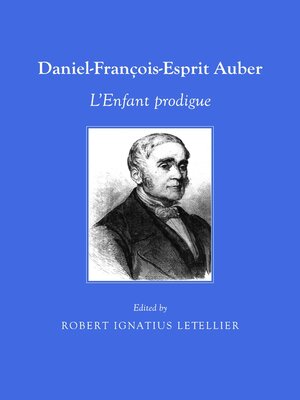
Sign up to save your library
With an OverDrive account, you can save your favorite libraries for at-a-glance information about availability. Find out more about OverDrive accounts.
Find this title in Libby, the library reading app by OverDrive.



Search for a digital library with this title
Title found at these libraries:
| Loading... |
Daniel-François-Esprit Auber (1782–1871) was long considered one of the most typically French as well as one of the most successful of the opera composers of the 19th century. Although musically gifted, he initially chose commerce as a career, but soon realized that his future lay in music. He studied under Cherubini, and it was not long before his opéra-comique La Bergère Châteleine (1820), written at the age of 38, established him as an operatic composer. Perhaps the greatest turning point in Auber's life was his meeting with the librettist Eugène Scribe (1791–1861), with whom he developed a long and illustrious working partnership that only ended with Scribe's death. Success followed success; works such as Le Maçon (1825) and La Muette de Portici (1828) brought Auber public fame and official recognition. In 1829 he was appointed a member of the Institut, in 1839 Director of Concerts at Court, in 1842 Director of the Conservatoire, in 1852 Musical Director of the Imperial Chapel, and in 1861 Grand Officer of the Légion d'Honneur.Auber seems to have been fated to live in revolutionary times; during his long life no less than four revolutions took place in France (1789, 1830, 1848, 1870). Auber's famous historical grand opera La Muette de Portici (also known by its hero's name as Masaniello) is perhaps unsurprisingly based on revolution, depicting the 1647 Neapolitan uprising against Spanish rule. It is a key work in operatic history, and has a revolutionary history itself: it was a performance of this work in Brussels in 1830 that helped spark the revolution that led to the separation of Belgium from Holland. It was a revolution that hastened Auber's death at the old age of 89. He died on 12 May 1871 as a result of a long illness aggravated by the privations and dangers of the Siege of Paris. He had refused to leave the city he had always loved, even after his house had been set on fire by the petroleurs et petroleuses. In a twist of fate, a mark had been placed on the house of the composer of Masaniello, the very voice of Romantic liberty!Auber's overtures were once instantly recognizable, favourites of the light Classical repertoire. His gracious melodies and dance rhythms had a huge influence, both on piano and instrumental music, and on the genre of Romantic comic opera, especially in Germany. Musical tastes and fashions have changed, and contemporary audiences are more accustomed to the heavier fare of verismo, Wagnerian transcendentalism, and twentieth-century experimentalism. The operas themselves, apart from Fra Diavolo (1830), are seldom performed, yet Auber's elegant, delicate and restrained art remains as appealing to the discerning listener as ever it was.L'Enfant prodigue, an opéra in five acts, with libretto by Eugène Scribe, was first performed at the Académie nationale de musique (Salle de la rue Le Peletier) on 6 December 1850. The story is derived from the famous parable in St Luke's Gospel (ch. 15). The scene is set in Old Testament times, in Ancient Israel and Egypt.Azaël, the only son of Reuben, a poor Israelite, leaves the paternal home and his betrothed Jephtèle to go and sample the pleasures promised by the great city of Memphis. He ruins himself in gambling and is seduced by the courtesan Nephté and the dancer Lia. Rejected and destitute, he is rescued from the Nile in act 4 by the leader of a caravan, and is reduced to tending a flock of sheep. In the final act the prodigal son comes to his senses, and returns home to throw himself into his loving father's arms. Scribe produced a libretto without dramatic action, which, however, provided good static situations for the composer. The orchestra…






